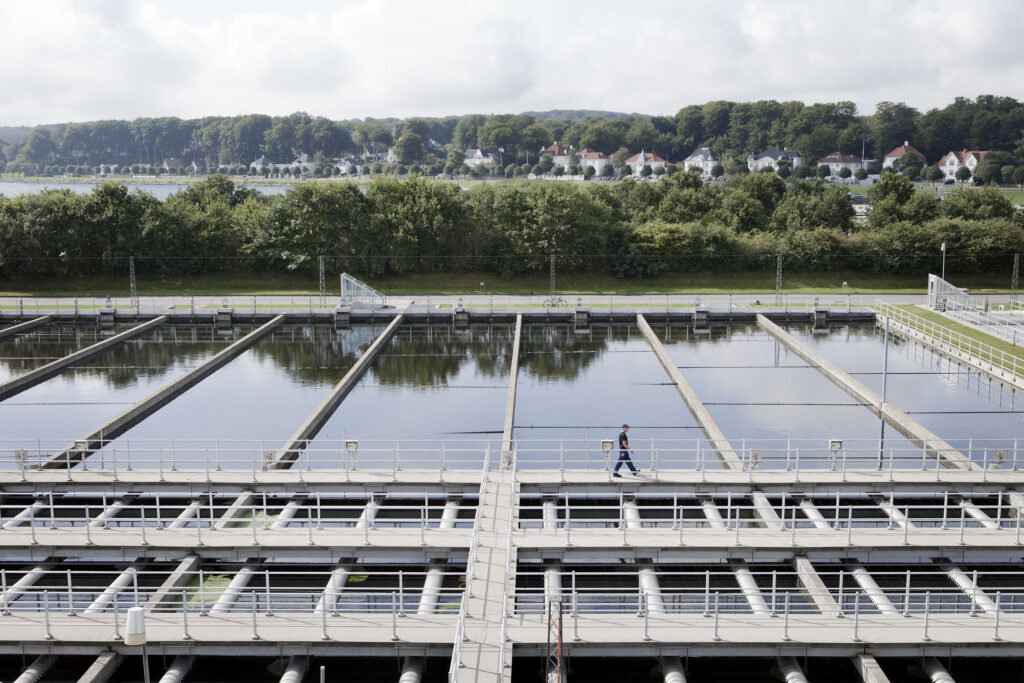The circular economy of water in Aarhus
Traditionally, wastewater treatment plants are high-energy consumers. Water and wastewater treatment processes account for 25-40% of the municipality’s electricity bill. The objective of the wastewater treatment plant at Marselisborg in the city of Aarhus, Denmark, has been to optimise all processes and generate surplus energy to meet the needs of all wastewater treatment facilities in the region. Additionally, in 2006, there were 14 smaller plants catering to half of the population consisting of several hundred thousand people. These smaller plants have since been consolidated into just four larger plants, with the Marselisborg wastewater treatment plant being the largest among them.
Aarhus Vand has converted wastewater into green energy at the Marselisborg wastewater treatment plant. Over the past decade, the plant has achieved an impressive 25% reduction in power consumption. Simultaneously, energy production has increased, resulting in the plant now producing 50% more electricity than it consumes. This surplus energy is sufficient to meet the energy needs of the entire water cycle, encompassing drinking water production, distribution, and the collection and treatment of wastewater.
To achieve these remarkable outcomes, Aarhus Vand has implemented various energy-saving technologies. These include an advanced SCADA control system, a new turbo compressor, sludge liquor treatment based on the anammox process, and optimisation of the fine bubble aeration system. These initiatives have collectively reduced power consumption by approximately 1 GWh per year. Furthermore, Aarhus Vand has significantly improved energy production through the implementation of energy-efficient biogas engines through combined heat & power (CHP), resulting in an increase in electricity production of approximately 1 GWh per year. Additionally, Aarhus has installed a heat exchanger with the aim of supplying surplus heat to the district heating grid, representing around 2 GWh per year.
The optimised operations at the Marselisborg wastewater treatment plant have proven to be an efficient and effective measure contributing to a low-carbon city and circular economy. This success story showcases Aarhus Vand’s commitment to the IWA’s Climate Smart Utilities initiative, highlighting their dedication to sustainable practices in the global water sector.
Mitigation actions
As one of the leading companies in the Danish water industry, Aarhus Vand operates in the field of drinking water and wastewater treatment in the city and the surrounding rural areas, working with the treatment, distribution, and collection of wastewaters. The utility works closely with the Aarhus Municipality to execute a wide variety of environmental and urban development projects which take climate changes into consideration. One such project is the Marselisborg wastewater treatment plant, which over the past 10 years has achieved approximately a 25% reduction in power consumption while simultaneously increasing its energy production. This wastewater treatment plant currently produces 50% more electricity than it consumes. Through the optimisation of their systems, the Marselisborg Wastewater Treatment Plant is now able to not only reduce its energy consumption by approximately 1 GWh/year, which corresponds to about 25 percent in total savings, but it has also transformed energy consumption into an energy production cycle.
Aarhus believes there is significant potential in wastewater treatment, with the ability to both generate energy from wastewater and ensure proper treatment. The utility currently treats the wastewater generated by the city’s inhabitants to a high standard, allowing for its discharge into Aarhus’ inner-city harbour. The treated wastewater is of such good quality that it is even safe for swimming, thanks to the efforts of Aarhus Vand and their commitment to effective wastewater management.
Resource recovery is another approach the utility employs in its efforts to mitigate climate change. Currently, the Marselisborg treatment plant focuses on the recovery of phosphorus. Phosphorus is considered a scarce resource and plays a vital role in sustaining all life on Earth. The recovery of phosphorus from wastewater is a crucial element in preserving global phosphate reserves. It is estimated that wastewater recovery could potentially meet 20% of the world’s current phosphorus demand, highlighting its significant contribution to resource sustainability and circularity.
Communication with citizens
Globalisation is a key focus area in Aarhus Vand’s business strategy leading up to 2025. The objective is to share our solutions with the world and bring back new knowledge to our home base. Aarhus Vand fulfils this role as a water ambassador, water supplier, and water innovator.
Aarhus Vand actively facilitates the export of Danish water technology through collaborations with the Water Technology Alliance (WTA) in various regions, including the USA, Europe, and the Middle East. As a water supplier, the utility leverages its expertise to support consultants and contractors in delivering high-quality utility services. Additionally, as a water innovator, Aarhus Vand contributes to global innovation and development in the water sector.
Lessons learned
- It is energy and cost efficient to treat wastewater at larger plants
- Operating fewer but larger plants decreases operation and maintenance costs
- Implementation of energy-saving technologies is both financially and environmentally a good investment
- There is a great potential in wastewater treatment and resource exploitation
Submit your Utility Case Story
Feeling inspired by this story? Learn more about the IWA Climate Smart Utilities Initiative or contact us at climate@iwahq.org


